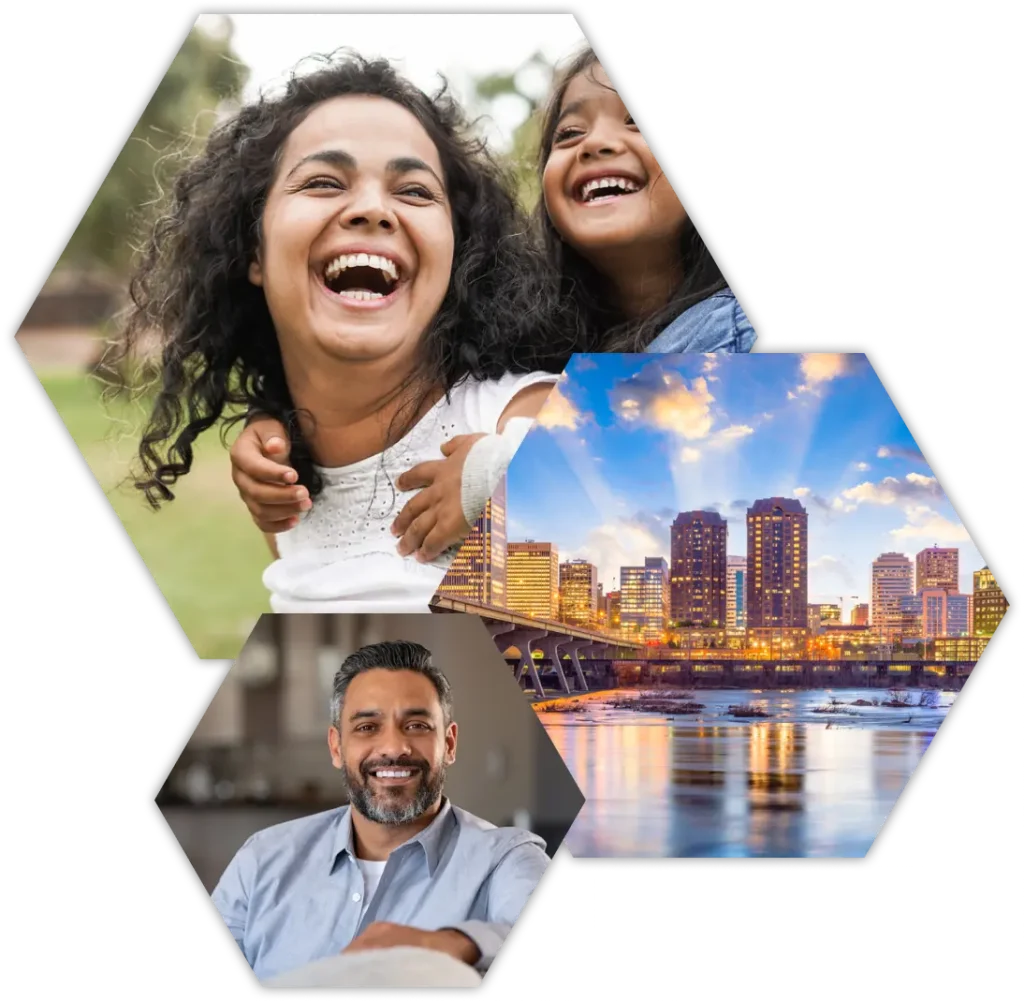If you are in the Richmond area and need help with drug and alcohol addiction – call (704) 248-8561.

Richmond, Virginia, is a city rich in history and culture, once serving as the capital of the Confederacy during the Civil War and home to historic sites like the American Civil War Museum and St. John’s Church. Designed by Thomas Jefferson, the Virginia State Capitol stands as an architectural treasure. Unfortunately, even with all this beauty, residents are troubled with addiction and mental health disorders. These can range in type and severity, including depression, anxiety, bipolar disorder, post-traumatic stress disorder (PTSD), and drug and alcohol addiction.
Richmond offers a range of substance abuse treatment options for individuals struggling with drug and alcohol addiction. These Richmond drug treatment centers offer guidance, community-based support, program opportunities, and more to aid in sobriety journeys.
In Richmond, Virginia, a wide range of drug and alcohol treatment services are available, each tailored to meet the unique needs of individuals seeking long-term sobriety. The available programs are designed to provide personalized care and support throughout the recovery process.
Inpatient rehab, also known as residential treatment, involves staying at a treatment facility 24/7 for a designated period, typically ranging from 30 to 90 days, but can be longer if needed. These programs provide intensive care and support within a highly structured environment, allowing individuals to focus solely on their recovery without the distractions and triggers of everyday life. Patients receive round-the-clock medical supervision, participate in daily therapy sessions, and engage in various therapeutic activities designed to promote healing and personal growth.
Outpatient rehab offers flexible treatment options that allow individuals to attend therapy sessions and other recovery activities while continuing to live at home. Outpatient programs typically involve several hours of therapy per week, including individual counseling, group therapy, and educational sessions. This format allows individuals to maintain their daily responsibilities, such as work, school, and family obligations, while receiving the support they need to recover.
Detoxification, or detox, is the first step in the addiction treatment process for many individuals. Medically supervised detox programs are designed to help individuals safely manage the withdrawal symptoms that occur when they stop using drugs or alcohol. The process involves close monitoring by healthcare professionals who can provide medications and other interventions to ease discomfort and prevent complications. Detox prepares individuals for further treatment by stabilizing their physical health and ensuring they are ready to engage in therapeutic activities and counseling.
Holistic therapies focus on treating the whole person—mind, body, and spirit—rather than just the symptoms of addiction. These treatments include a variety of practices designed to promote overall well-being and balance. Common holistic therapies include yoga, meditation, acupuncture, nutritional counseling, and art therapy. By incorporating these methods, treatment programs aim to address the underlying causes of addiction, reduce stress, and improve mental and physical health. Holistic therapies are often used alongside traditional treatment methods to create a comprehensive and individualized approach to recovery.
Counseling and therapy are core components of addiction treatment, providing individuals with the tools and support they need to understand and overcome their addiction. Various therapeutic approaches are used, including:
These therapeutic approaches aim to address the underlying psychological, emotional, and behavioral issues that contribute to addiction, fostering long-term recovery and personal growth.
Aftercare support is essential for maintaining sobriety and preventing relapse after completing a primary treatment program. Continuous support and resources are available to help individuals navigate the challenges of post-treatment life and successfully reintegrate into their communities. By providing a network of support, aftercare programs help individuals build on the progress they made during treatment and sustain their recovery journey over the long term.
When searching for a drug treatment center in Richmond, it's essential to find a facility that meets your specific needs and provides comprehensive, high-quality care. Here are ten key factors to consider:
Here are ten essential things to look for:
1. Accreditation and Licensing:
Ensure the treatment center is accredited by reputable organizations, such as the Joint Commission or CARF (Commission on Accreditation of Rehabilitation Facilities) and licensed by the state of Virginia.
2. Qualified Staff:
Look for centers with a team of qualified professionals, including licensed therapists, doctors, nurses, and addiction specialists. Staff credentials and experience are crucial for effective treatment.
3. Comprehensive Assessment:
A thorough initial assessment should be conducted to develop a personalized treatment plan tailored to the individual’s needs, including medical, psychological, and social factors.
4. Evidence-Based Treatment Approaches:
The center should use evidence-based treatment methods, such as Cognitive Behavioral Therapy (CBT), Dialectical Behavior Therapy (DBT), and Medication-Assisted Treatment (MAT), which are proven to be effective in treating addiction.
5. Range of Services:
Look for a facility that offers a full continuum of care, including detoxification, inpatient/residential treatment, outpatient programs, and aftercare support to ensure long-term recovery.
6. Holistic Therapies:
In addition to traditional therapies, the center should provide holistic treatment options, such as yoga, meditation, art therapy, and nutritional counseling, to address the whole person.
7. Family Involvement:
Family support and involvement can be critical to the recovery process. Choose a center that includes family therapy and education as part of the treatment plan.
8. Relapse Prevention Programs:
Effective treatment centers should have robust relapse prevention programs that teach coping skills, stress management, and other strategies to maintain sobriety post-treatment.
9. Aftercare and Support:
Ongoing support after the initial treatment is crucial for long-term success. Look for facilities that offer comprehensive aftercare plans, including alumni programs, support groups, and resources for continued recovery.
10. Comfortable and Safe Environment:
The physical environment of the treatment center should be comfortable, clean, and safe, providing a supportive atmosphere conducive to healing and recovery.

Richmond provides a wealth of community resources, including support groups, counseling services, sober living homes, vocational training programs, and legal assistance for individuals dealing with substance abuse and mental health issues.
Here are a few addiction-related treatment resources available in Richmond:
Curb the Crisis – A state website dedicated to helping Virginians recognize and respond to the rising opioid crisis.
Southeastern Recovery Center – Drug and Alcohol Addiction Treatment
SAMHSA National Helpline – Confidential, free help from public health agencies to find more information on addiction and mental health resources.

According to the Virginia Department of Health, the state experienced 2,490 drug overdose deaths in 2022, with 79% of them involving fentanyl, fentanyl analogs, and tramadol. Richmond has been particularly affected by opioids – in 2019, there were 60 fatal opioid overdoses in the city, which more than doubled to 155 in 2020. Non-fatal overdoses also saw a 50% increase during the same period.
It is important to understand local statistics associated with drug and alcohol addiction. These statistics can shed light on how big of an impact substance abuse has on Richmond, Virginia. These statistics can help inform policy decisions, resource allocation, and community interventions that are aimed at addressing addiction issues within the city.
AA (Alcoholics Anonymous) and NA (Narcotics Anonymous) meetings play a crucial role in supporting individuals struggling with addiction in Richmond, Virginia. These meetings offer a safe, confidential environment where participants can openly share their experiences, challenges, and successes with others who understand the struggles of addiction firsthand.
By following the 12-step program, attendees acquire essential tools for maintaining sobriety and rebuilding their lives. These meetings foster a sense of community and belonging, allowing individuals to form connections with peers who provide empathy, encouragement, and accountability. Regular attendance and active participation help individuals break the cycle of addiction, repair their relationships, and regain control over their lives, ultimately leading to long-term sobriety and personal fulfillment.
To find local meetings, call 800-681-2956 – or check out a list below to get started.
To find local meetings (in-person and virtual), click here – or check out the list below.
Explore sober-friendly activities and events in Richmond, such as outdoor recreation, fitness classes, art workshops, support group meetings, and cultural events. Engaging in sober activities can promote social connections and enhance overall well-being during recovery.
Here are some sober activities you can do in Richmond, VA:

Covering the costs of addiction and mental health treatment can seem daunting, but there are several options available to make it more manageable. Here are some common payment methods for recovery centers in Richmond, Virginia:
Many addiction and mental health treatment facilities in Richmond accept insurance. Before beginning a treatment plan, it’s important to check what your insurance policy will cover and determine any out-of-pocket expenses you may need to handle.
If you are financially unable to pay the full cost of treatment, you might qualify for sliding scale fees. This payment structure is based on your income, making it easier to afford treatment at Richmond recovery centers.
If your insurance doesn’t cover the treatment costs and you don’t qualify for sliding scale fees, you may be able to negotiate a payment plan with the treatment facility. This can spread out the cost over time, easing the financial burden.
Richmond offers various addiction treatment programs, including inpatient rehab, outpatient rehab, detoxification services, holistic therapies, counseling and therapy, and aftercare support.
Accredited treatment centers typically display their certifications from reputable organizations like the Joint Commission or CARF. You can also verify accreditation on the respective accrediting body’s website.
Yes, many addiction and mental health treatment facilities in Richmond accept insurance. It’s advisable to check with the specific center and your insurance provider to understand what is covered.
The initial assessment involves a comprehensive evaluation of your medical, psychological, and social history. This helps in developing a personalized treatment plan tailored to your specific needs.
Holistic therapies address the mind, body, and spirit. They include yoga, meditation, acupuncture, nutritional counseling, and art therapy. Many Richmond treatment centers incorporate holistic approaches alongside traditional treatments.
Yes, family involvement is often encouraged. Many centers offer family therapy sessions and educational programs to help family members support their loved one’s recovery.
Richmond treatment centers often provide specialized programs tailored to specific addictions, such as alcohol, opioids, and other substances. These programs use targeted therapies and approaches suited to each type of addiction.
Aftercare support is crucial for maintaining sobriety. Richmond centers offer various aftercare services, including ongoing counseling, support groups, sober living arrangements, and access to community resources.
Inpatient rehab programs can vary in length, typically ranging from 30 to 90 days, though some may extend to several months depending on the individual’s needs and progress.
